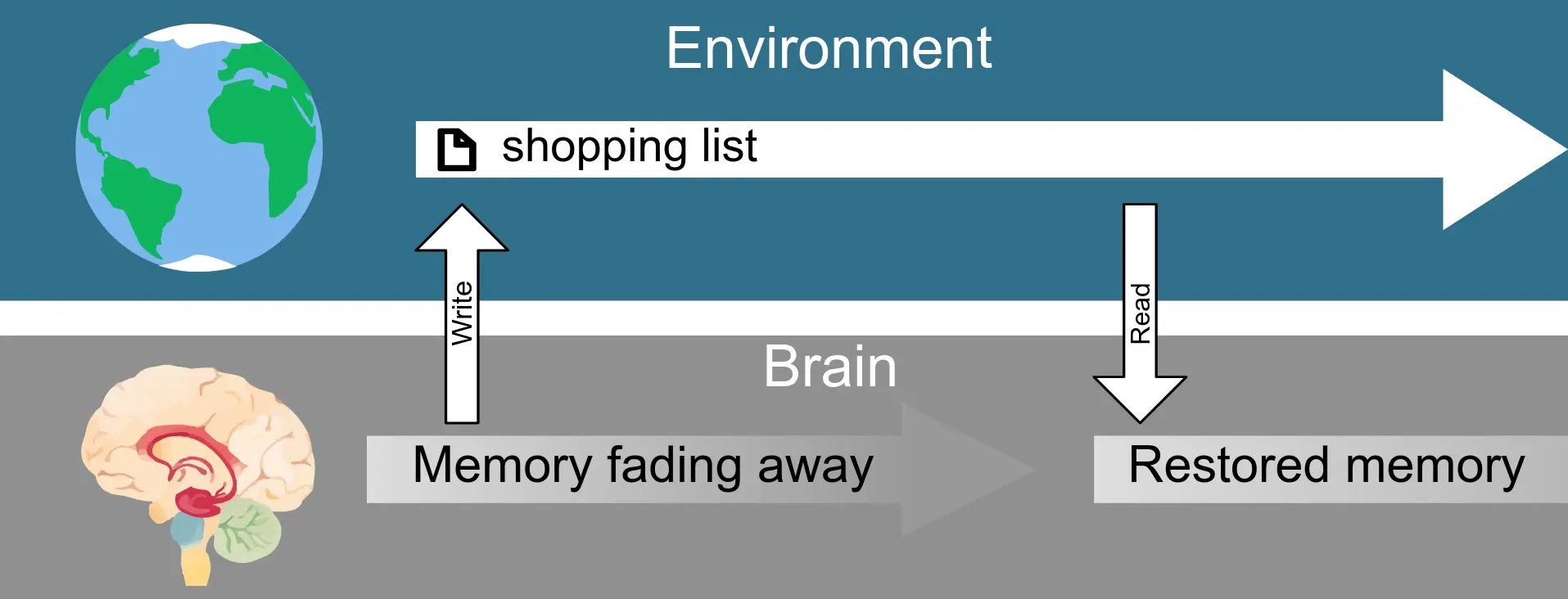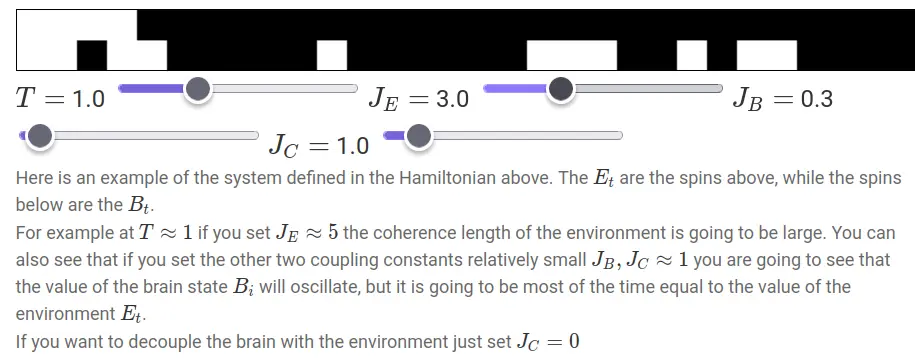year: 1998
paper: local
website:
code:
connections: tool-use, self, mind
My environment is part of my mind (to different extents).
In Nature: Ants leaving pheromone trails, …
Key Points:
- Active Externalism vs. Passive Externalism:
- Passive externalism (as argued by philosophers like Putnam and Burge) holds that while external factors can influence the content of mental states, the actual processing occurs internally.
- Active externalism posits that external components can be integral parts of cognitive processes, not just influences on them.
- Thought Experiments Illustrating Extended Cognition:
- Tetris Example: Players rotate shapes either mentally, physically using a button, or via a neural implant. The authors argue that physically rotating the shapes or using an implant involves cognitive processes that are not solely internal.
- Otto and Inga Case:
- Inga remembers the location of a museum using her biological memory.
- Otto, who has Alzheimer’s disease, relies on a notebook to remember the same information.
- The authors argue that Otto’s notebook functions as an external memory and should be considered part of his cognitive system, just as Inga’s biological memory is part of hers.
- Criteria for Extended Belief:
- The external resource must be readily available and typically relied upon.
- The individual must automatically endorse the information retrieved from the external source.
- The information should have been consciously endorsed in the past. - Implications for the Notion of Mind and Self:
- The mind is not limited to the brain but can include external devices and environments that are functionally integrated into cognitive processes.
- This view affects how we understand beliefs, desires, and mental states, suggesting they can be partly constituted by external factors.
- It challenges the traditional concept of the self, proposing that individuals can be seen as extended systems encompassing both internal and external elements. - Consequences for Cognitive Science and Philosophy:
- Encourages a shift in research methodology to consider the environment as part of cognitive systems.
- Suggests that tools like language, notebooks, and computers are not just aids but integral components of cognition.
- Raises ethical and moral questions about the treatment of external components that are part of one’s cognitive system.
Link to originalBrain + Environment
Let’s start with a system inspired by how the brain is thought to work.
One can naively say that the way the state of the brain at the time depends from the state . We are assuming the time to be discretized, but this can be easily generalized.This effectively makes the brain an autoregressive model, thus it is incapable of retaining information for an indefinite amount of time. On one hand, we human beings do forget lots of things, but on the other hand we seem to be able to also have long-term memory and the ability to stick to a plan for even decades.
However we (and some other organisms) also augment our finite memory by deliberately interacting with the environment, this way we are able to remember stuff for much longer.
For example when you go shopping, you write down what you have to buy on a piece of paper, this is because information stays there longer and more reliably than if you try to remember it.
This example also raises an interesting observation: When you read your shopping list, you effectively “interact” with your past self though interacting with a piece of paper memories, whether internal or on paper, are messages or prompts from your past self. In some sense we can say that effectively where is when you are at the supermaket, and is when you are at home writing the shopping list.
This sort of thing happens all the time, our brain constantly interacts with the surrounding environment so much that it is impossible to study the brain independently from the environment (and reconstructs its state from engrams available to it) as such a thing doesn’t exist.
This concept echoes The extended mind thesis, a perspective that suggests our cognitive processes are intricately linked with our environment. According to this view, the study of the brain cannot be divorced from its ongoing interaction with the surrounding world, as it challenges the idea of a self-contained, isolated brain, highlighting the significant influence of external factors and tools on human cognition.
Link to originalModeling of Brain-Environment Coupling Using Spin Chains
Let be the state of the brain at time and the state of the environment, we can say that the way they evolve is ruled by a set of equations like this:
Note that this is simply an autoregressive model made of two coupled autoregressive models, however we can assume that the environment is capable of holding on to information for longer.
We can simplify a system like this by assuming that both the brain and the environment have only two possible states: 0 or 1. [lmao]
We can think of it as two spin chains with different coupling constants and , since the environment has a much bigger coherence length, we can assume that . We also assume that there is a coupling constant that couples the neighbouring spins of the two chains.
The hamiltonian becomes:Thus, what effectively happens when is not too small, the coherence length of the brain chain becomes equal to the one of the environment.
What does it mean for the brain and the environment to be coupled?
Increased Coherence: The brain’s coherence length (the range over which its states are correlated) increases (e.g. in the pic above ’s coherence is high, it has a continual string of s).
Memory Extension: The brain can retain information over longer periods due to the environment’s influence.
Unified System: The brain and environment function as a single, integrated system rather than two separate entities.Systems like this made from a model with limited context length + an external environment can be found in the language modeling + reinforcement learning literature … for example Voyager … the agent is capable of using skills and information that has been written in the distant past. This effectively increases the context length of the language model

